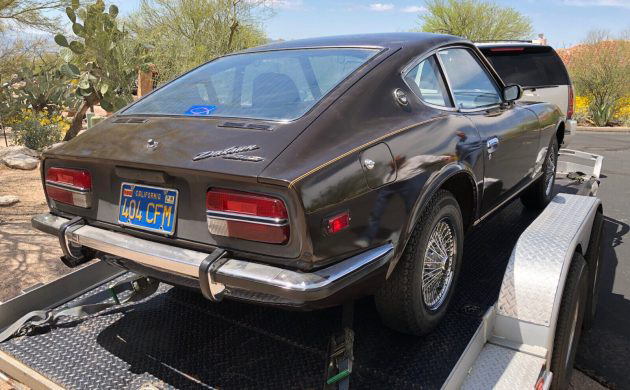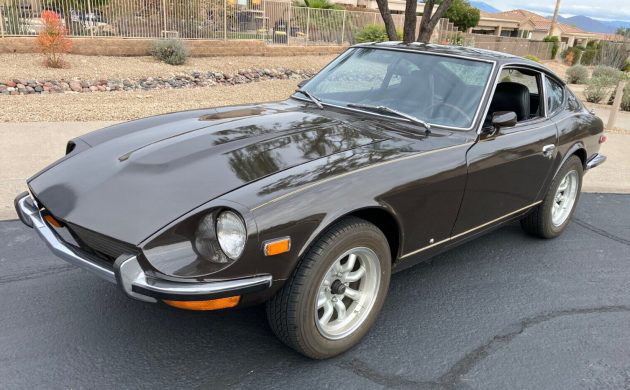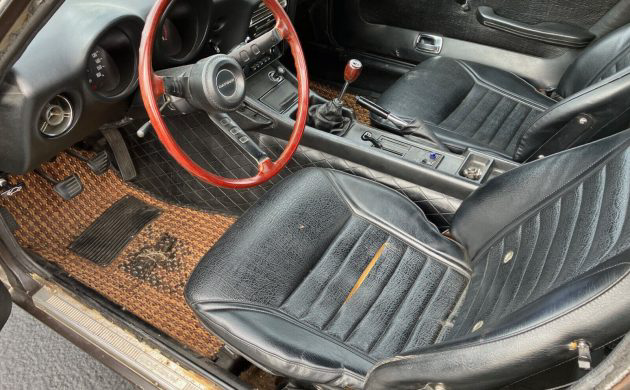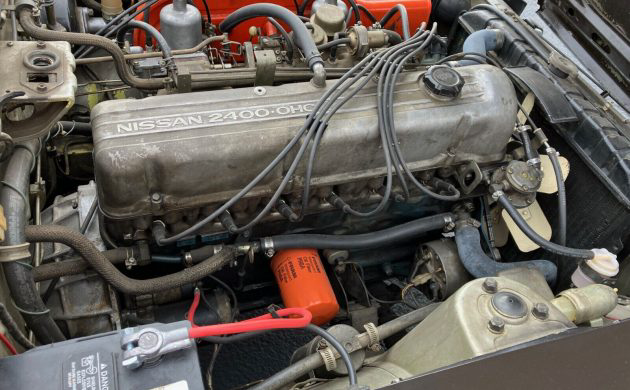Rare Series 1: 1971 Datsun 240Z

In the world of Z cars, the holiest of grails is the unrestored Series 1 that has no rust and hasn’t been modified. This particular 1971 Datsun 240Z is almost that car, save for an unfortunate respray to a fairly awful brown color taken from the Mercedes-Benz factory color wheel. The Z is claimed to be a lifelong California resident that was apparently retrieved with its authentic blue plates still attached and some unfortunate wire wheels which have since been removed. The 240Z is now listed here on eBay with bids to $6,800 and the option to Buy-It-Now for $32,500.

As you can see, the seller has updated the wheels with a slick set of Paansports, a wheel design seemingly made for a classic Z car. The paint remains, and the seller is correct that in this car’s next life, it should be stripped down and resprayed in its correct color. The listing notes it left the factory wearing yellow paint which is undoubtedly one of the more sought-after Z car colors, and you can still see traces of it in places. The earth tone 70s were interesting times, and it’s hard to fathom willingly covering up a bright and cheerful paint scheme with such a drab color. However, the big deal here is having a Z car with no rust.

The interior remains highly original, with the Z car’s bucket seats showing some modest signs of wear. I love period-correct details like the Coco-style mats, which have clearly been in the car for many years. The seller confirms the highly fragile dash pad remains crack-free, which is somewhat incredible for a car from California. If you know anything about vintage Zs, you know that finding one with a crack-free dash is near impossible. The listing also highlights that this 240Z has rare dealer-installed air conditioning that remains intact but will need a shot of freon to blow cold once more.

The inline-six is a numbers-matching engine, adding another layer to this 240Z’s desirability. Finding a Series 1 is just the tip of the iceberg, as you’ll want to also track down a car without much rust and with its factory engine and transmission still bolted in. The engine made a respectable 150 b.h.p. and 146 lb-ft of torque, which is still enough to make this iconic 70s sports car a blast to drive today. Despite looking like a potential flip, the seller confirms he has driven this 240Z for the last five years, and that it’s simply time to sell. Hopefully, the next owner sorts out the paint job and continues to drive it.


Comments
Is Nissan still buying back super-clean 240Z’s and super-reconditioning them?
Wow! Impressive.
That program was just 1996/1197.
Out of curiosity, how do you identify a Series I in case I ever come across one?
Model Year Differences
Knowing how to discern a Series 1 from a Series 2 is relatively straightforward, but correctly identifying the exact model year of a 240Z can be more difficult.
Consider the scenario in which you know a particular vehicle is a Series 1 240Z. Determining whether it is a 1970 model or (early) 1971 is not something you can do with a quick glance. One hint could simply be the color of the car, and you can take a look at our color guide which may help you figure out the year. Unfortunately there are not enough reliable differences to reliably make this determination otherwise. You could also take a look at the VIN number of the car. The latest VIN you might see for a 1970 240Z is around HLS30-11600, whereas the earliest VIN you might see for an early 1971 240Z is around HLS30-05500. You will notice that there is some significant overlap here — so even this isn’t a completely reliable method.
Now consider the scenario where you know a particular vehicle is a Series 2 240Z, and you want to know the exact model year: late 1971, 1972, or 1973. Again, this is difficult to determine at first glance. You probably won’t be able to make this determination on a 240Z that is driving past you.
1973 240Zs featured “flat-top” SU-carburetors as opposed to the “round-tops” with all the model years. They also featured extended 5 MPH bumpers that you can spot if you know the subtle differences to look for. In general, they are subtly larger overall.
Extended 5 MPH bumpers can make a 1973 240Z (left) easy to spot.
This leaves the final question — how do you discern a late 1971 240Z from a 1972? The easiest method is to look at the wheel covers: The 1972 model year saw the introduction of teardrop-style wheel covers, as opposed to the original “D” wheel covers. This isn’t the most reliable method however, as a huge number of 240Zs across all model years have been converted to use slotted mags as opposed to original wheel covers.
I believe the gen 1’s had a vertical, as opposed to horizontal rear window defroster. Just saying
zcarguide.com
Nice Z. Looks like it was repainted brown, but they didn’t paint the engine compartment. Normal wear and tear.
I can see going with brown, just not that brown.
Worth every cent of the BIN price. Arizona car all it’s life and clearly well cared for and stored. What’s not to love.
wow, going from yellow to brown is just…bizarre
That happened in the ’70s…keep that in mind. Anyway, here’s another car that can be enjoyed now without affecting its value much, and then getting restored later to factory specs, yellow paint and all. And I love the dealer ac, adds to this car’s novelty.
IDK, I like it. There I said it. Not as great as the original color but ..
I owned a ’71 240Z in the mid ’70’s.
Great car to drive.
I had two 76′ 280’s .one a couple and the other our 2+2 family car. Then an ’81 zx gl , then an ’85 300 zx. I now have a ’78 280z. Love it. They are a blast to drive. I loved to adjust the lifters in my ’76 coupe and go racing. Everyone thought I had a turbo charger on it.but it kinda scared the he’ll out of after 125 mph. Stones hitting the inner federal wells sound like firecrackers going off.
I had two 76′ 280’s .one a coupe and the other our 2+2 family car. Then an ’81 zx gl , then an ’85 300 zx. I now have a ’78 280z. Love it. They are a blast to drive. I loved to adjust the lifters in my ’76 coupe and go racing. Everyone thought I had a turbo charger on it.but it kinda scared the he’ll out of after 125 mph. Stones hitting the inner federal wells sound like firecrackers going off.
Back in the day these cars were Cop magnets 🧲 so I can see toning it down with the Brown from arrest me now BRIGHT Yellow – that said yes restore it to OG with that numbers matching engine it’s a NO brainer.
One of the engine compartment pictures appears to show the original color to be 112 Lime rather than 919 Sunshine Yellow. So the exterior was repainted brown and the engine compartment silver. Pretty crazy! I would be shocked if it sells if the reserve is close to the BIN price. But that’s just my opinion.
I used to own one of these back in the day. One big selling point to me is the light under the hood. It had a wire and you could put it where you needed on the engine compartment and when you grounded it, would light up the spot. I know, its the little things that amuse me.
Cool car!
Watanabes are nice replacement.